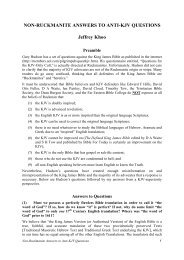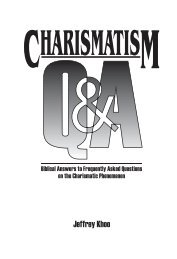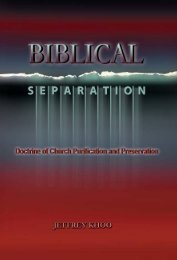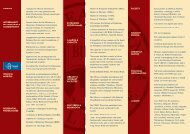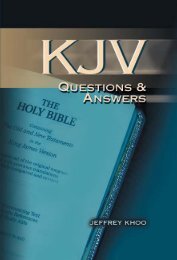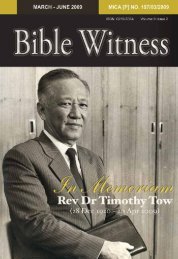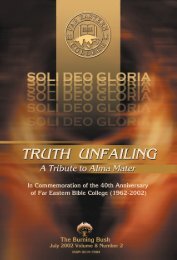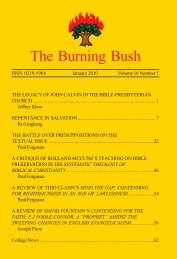Biblical Separation Defended - Far Eastern Bible College
Biblical Separation Defended - Far Eastern Bible College
Biblical Separation Defended - Far Eastern Bible College
- No tags were found...
You also want an ePaper? Increase the reach of your titles
YUMPU automatically turns print PDFs into web optimized ePapers that Google loves.
present day Christian layman, teacher. and evangelist. This is preciselyDr. Ferm’s conclusion.The Writer’s CritiqueThe method of cooperative evangelism is for the conservativespeaker to completely and entirely ignore the error of liberalism, and totreat those on the sponsoring committees who are liberals as if they werefine brethren who teach the truth. Can this be defended on the groundsthat the Lord’s method of combating error was by generally ignoring it?In order to answer this some observations on Christ’s procedure are herenecessary.It must first be observed that the Lord treated errors in more thanone way, depending on the faith or faithlessness of the erring person andthe negligibleness or gravity of the error and its effects. However, thereis a uniform element in the Lord’s treatment of error. This is the fact thatHe never gave His approval or sanction to the error. The fact that it wasmorally impossible for Him, being divine, to cooperate with or go alongwith error is the backbone of the rebuttal which conservatives give toliberals who in their advocacy of the Kenosis Theory contend that theLord went along with many of the errors of His day. In view of this howcan Dr. Ferm justify cooperative evangelism’s giving the impression tothe public that known liberals are religious worthies by allowing them topray in the evangelistic service, by directing converts to their churches,and by speaking favorably of them in public?It is difficult to cite individual errors which were ignored by theLord, because who can point to an error and then claim that the Lordwho had omniscient eyes and the mind of God never addressed Himselfto it in His often sublime and subtle words of deep meaning. One canonly at most declare on any particular error that he does not see where orwhen the Lord corrected it plainly, but who can declare that the Lordsimply ignored it? To assert the truth in the face of an error, and thuscorrect it without mouthing the words, “I am now correcting such-andsuch’serror,” is in fact to correct the error, and even this practice cannotbe considered as “ignoring” the error. In any case the thesis that the Lordcorrected errors largely by ignoring them cannot by the nature of the80




